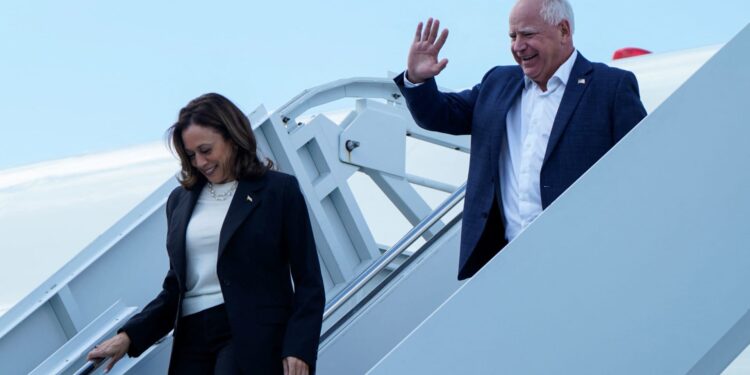Democratic presidential nominee Kamala Harris in a new interview Thursday defended her vice presidential record on immigration and blamed her Republican rival Donald Trump for killing a bipartisan bill aimed to address the U.S.-Mexico border.
Harris said her work to address the root causes of U.S. migration from the so-called Northern Triangle “has actually resulted in a number of benefits, including historic investments by American businesses in that region.”
“The number of immigrants coming from that region has actually reduced since we began that work,” she told CNN anchor Dana Bash in her first sit-down interview since becoming the Democratic nominee.
Harris said that she and President Joe Biden, who dropped his reelection bid in July, had worked with Congress to craft a bipartisan bill that would have helped secure the border.
“Donald Trump got word of this bill that would have contributed to securing our border,” Harris said, “and because he believed that it would not have helped him politically, he told his folks in Congress, ‘Don’t put it forward.'”
“He killed the bill, a border security bill that would have put 1500 more agents on the border,” she said.
Harris vowed to sign that bill into law if she beats Trump in the Nov. 5 election.
The remarks came in her first joint interview with Harris and her running mate, Minnesota Gov. Tim Walz, on the campaign trail.
Harris and Walz have come under fire from their Republican rivals, Trump and Sen. JD Vance of Ohio, over their lack of exposure to the press.
The interview took place at Kim’s Cafe in Savannah, Georgia, earlier Thursday.
Elsewhere in the interview, Harris responded to Trump’s bizarre claim that she only had recently begun identifying as Black, calling it the “same old tired playbook” that the Republican nominee has used before.
Speaking at the National Association of Black Journalists‘ annual convention last month, Trump claimed Harris “was always of Indian heritage and she was only promoting Indian heritage,” until she wasn’t.
“I didn’t know she was Black until a number of years ago, when she happened to turn Black and now she wants to be known as Black,” the former president continued.
Bash in Thursday’s interview noted, “He suggested that you happened to turn black recently for political purposes, questioning a core part of your identity.”
Harris replied, “Yes … Same old tired playbook. Next question, please.”
Bash asked, “That’s it?”
“That’s it,” Harris said.
Harris also told Bash that she plans to select a Republican to serve in her Cabinet if she defeats Trump in the November election.
“I have spent my career inviting diversity of opinion,” Harris said.
“I think it’s important to have people at the table when some of the most important decisions are being made that have different views, different experiences,” Harris said. “And I think it would be to the benefit of the American public to have a member of my Cabinet who was a Republican.”
Harris also defended the apparent policy shifts to the center she has made since her 2019 run for president.
“I think the most important and most significant aspect of my policy perspective and decisions is, my values have not changed,” Harris told Bash, singling out her values on border security and climate change.
Bash in the clip had asked Harris, “How should voters look at some of the changes that you’ve made, that you’ve explained some of here, in your policy?”
The vice president picked two hot-button issues to illustrate her point.
“You mentioned the Green New Deal,” Harris said. “I have always believed, and I have worked on it, that the climate crisis is real, that it is an urgent matter to which we should apply metrics that include holding ourselves to deadlines around time.”
“We did that with the inflation Reduction Act. We have set goals for the United States of America, and by extension, the globe, around when we should meet certain standards for reduction of greenhouse gas emissions,” she said.
“As an example, that value has not changed.”
Harris went on, “My value around what we need to do to secure our border — that value has not changed.”
“I spent two terms as the attorney general of California, prosecuting transnational criminal organizations, violations of American laws, regarding the passage — illegal passage — of guns, drugs and human beings across our border,” she said. “My values have not changed.”







